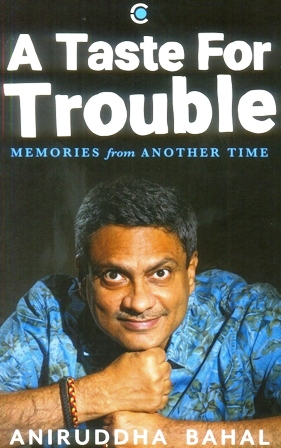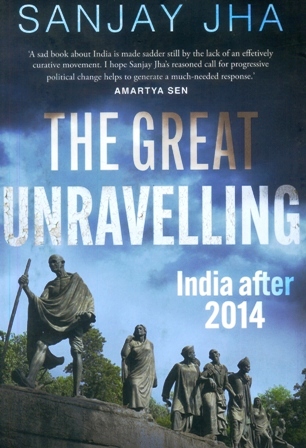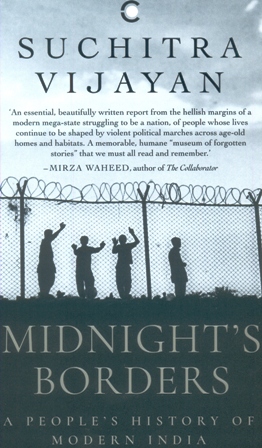-
Eating Wasps
In a small town by the river Nila, a thirty-five-year-old writer kills herself. No one knows why. Fifty-two years later, an antique cupboard in a private resort opens to reveal a frightened child. And the mystery begins to unravel. From the bestselling author of Ladies Coupe comes an unusual new novel about the intensity – and consequences – of desire. ANITA NAIR IS A FINE WRITER WITH A GREAT SENSE OF CHARACTER... AND AN EYE FOR TELLING DETAIL. SHE CAN MOVE FROM TENDER COMPASSION TO SENSUALITY TO RAGING HATRED... A COMPELLING TELLER OF STORIES.
-
A Taste For Trouble Memories From Another Time
ANIRUDDHA BAHAL has spelt trouble for the Establishment for as long as he can even remember. As a boy of barely fifteen, he ran away from home, all the way from Allahabad to Bombay—returning a week later, chastened and penniless, but with valuable lessons learnt. As a journalist, he transformed the definition and boundaries of reporting with the risks he took and the stories he chased down. And he paid the price for it. As a writer, his first novel won him international recognition— as well as the Bad Sex in Fiction Award, handed to him by no less a personage than Sting. As an entrepreneur, he went against the grain in setting up an investigative news portal at a time when speaking truth to power was no longer on the agenda of media houses. Over the years, this restless, mischievous boy from a village in Uttar Pradesh has come to epitomise the rough and tumble of political journalism in New Delhi. What does such a man see and remember when he looks back? Of people, incidents, turning points, the disappointments and the triumphs, both personal and professional? Some memories, Bahal says, are better left buried, but A Taste For Trouble brings together those that continue to keep him anchored in the present and hopeful about the future.
-
The Great Unravelling India After 2014
For the first time, I was not so sure that the survival of an idea could be taken for granted. But I was sure of one thing: the battle to salvage it, whether in whole or in part, had to be fought.’ Since May 2014, under a resurgent Bharatiya Janata Party, it appears that the Nehruvian—read liberal, secular, scientific—Idea of India has come utterly undone. Institutions of governance that had weathered great turbulence in the past seem to be disintegrating. The economy, once the celebrated ‘India story’, is in a shambles due to self-inflicted blows. Large sections of the media genuflect in cringe-worthy surrender to the ruling dispensation. Two hundred million Indians are being repeatedly reminded about their irrelevance in the new political narrative. Meanwhile, the grand old party of India flounders on unfamiliar territory—trapped in its past and unsure about its future. Sanjay Jha, long-time Congress spokesperson, now suspended from the party for his outspokenness against it, takes a long, hard look at what all of this means for the future of India. What are the reasons for the Congress’s acute lack of oppositional ability? Is a resurrection of this seemingly somnolent giant even possible? What would it entail? Can the party look beyond the easy fallback of the Gandhi-family charisma and embrace transformational change? Can it sell its vision—of inclusive growth and social justice—to a nation that seems mesmerised by hate? Even as he asks tough questions of the government and his party, Jha has not lost faith in Mahatma Gandhi’s India. He writes of renewal, of hope. And the Congress, he firmly believes, is central to that revival of India.
-
Midnights Borders A Peoples History Of Modern Indi
By the end of my travels, I found myself not with one map of India, but many maps that looked far different from the one I thought I knew.’ India is a land of borders, its peripheries nestling against seven countries. Over seven years, across 9,000 miles, Suchitra Vijayan travelled these borderlands. The more she travelled, the clearer it became to her that local history and memory bear no resemblance to the political history of the nation that claims these lands and peoples. From the densely populated border that India shares with Bangladesh to the highly disputed one with Pakistan, the stories in this book engage with how people live, struggle, fight and survive. A man escapes the floodlights that invade his home by blocking out all light, children use a border pillar as a handy cricket stump, and a family live out their lives beside the men who orchestrated their son’s death. These are stories that question our ideas of what freedom means and what it means to be a citizen. At a time when millions in India face loss of citizenship—the largest crisis of manufactured statelessness in human history—Vijayan’s clear-eyed, empathetic reportage provides a re-examination of the idea of territorial sovereignty. Midnight’s Borders, featuring over forty original photographs, is a compelling narrative of a country in crisis, turning against its own people while coping with the legacy of colonialism and Partition. As the margins close in on the mainland, this necessary account forces a reckoning with the brutality that informs India’s relationship with its borderlands.




